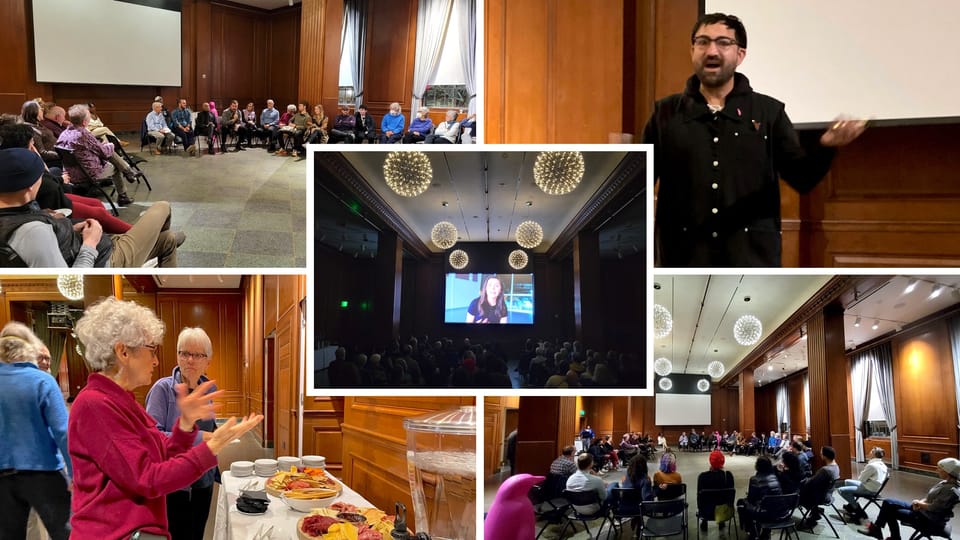Reflections on the 21C Screening of "Dance Became My Voice"

There was a tornado warning in December. I heard it on the radio as I drove from coffee shop to coffee shop in downtown Durham. The long, drawn-out beeping followed by the mechanical voice of the national weather service issuing commands to shelter in place interrupted Sublime’s “Santeria” playing on 96.1 out of the worn-down speakers of my 2005 Toyota Corolla. I’m sitting now next to a large glass window in the newly built marketplace, meditating a bit on what would happen if the 20-foot-tall pane of glass would shatter into a million pieces from the force of a tornado. I tend to write during storms.
I’m thinking about the screening at the 21C hotel that happened a couple weeks ago, and I wanted to share a bit about the event. It felt like the Durham I once knew. Folks who have lived in Durham for a while know what I mean:
Every event I went to as a child had a similar rhythm: people all knew each other, and the adults spent time asking about kids, loved ones, about everyone’s health, how school and work is going. The kids fielded questions, some more willing than others. People slowly made the rounds, scanning faces and eyes to make sure they'd heard from everyone. Anyone new was brought in with a flurry of questions (I’ve often heard from visiting friends who attend a Durham gathering how they’ve never been asked so many questions in their life). The way I was raised, you make “small talk” for hours and hours, giving each other space to share updates and news from loved ones.
The event at 21C felt a bit like that. It started at 4, but the screening did not happen until 5, so everyone had plenty of time and space to enjoy the hotel, some drinks, and each other’s company. It was an easy pace, and nothing was rushed.
After the initial mingling, our host, an artist who recently moved to Durham, Jonh, gave some introductory remarks. Jonh is the museum curator of 21C and is responsible for putting on events like this, events that brings arts and the community into the space. Jonh had seen Tony’s dance and my film at the American Dance Festival and had approached us with the idea of doing an event at the hotel.
Jonh’s work is interesting. He’s a poet, an organizer, a museum manager, and an all-around advocate for the arts. I really admire his passion and eye for art. He and I tend to spend time huddled together scheming about how we can leverage capital to help fund and support the arts. And I’ve learned a lot from the way he carries himself as an artist and thinks about what it even means to be an artist. His words as host were casual, but they carried a precision that only poets can pull off.
Following his remarks, we all watched the movie. The movie looked good on their screen. The sound echoed a bit more than I would like, but it was loud and filled the space well. It’s hard to avoid an echo in a cavernous hall with marble floors, and 21C’s event space is built beautifully for a wedding or private event, but not necessarily built with the acoustics of a movie in mind.
Following the movie, Jonh asked everyone (all 75+ people) to organize into a circle, and former mayor Steve Schewel moderated a discussion. Steve has been a major part of Durham for a long time. He founded the weekly newspaper Indy Week in 1983, serving as its president until 2012. He’s served on the school board, in countless community organizations, and served as the mayor of Durham from 2017 to 2021, helping guide Durham through the craziness of COVID. I mention Steve’s background because he brought this expertise to the conversation following the movie. He guided a conversation about Tony’s work, about where Tony and I think our work fits in the context of Durham today, and ultimately about the role art plays in a community like Durham.
There’s a lot I could say about the conversation, but instead of trying to cover everything, I’ll just share this: I learned something about the work I’m doing that surprised me. I realized in responding to Steve’s questions that, whether deliberately or not, I’m making works about the city that I grew up in. I’m grappling with the rapid change that many people in Durham are experiencing. The Durham I knew is becoming a memory that gives way to a bigger city, filled with the sound of construction that I don’t recognize. I mourn the town I knew in my childhood while I try to find ways to embrace this bigger, more wealthy, more whatever-the-heck Durham-is-becoming city. I’m telling stories to try to bridge the present with my memories. In this context, I’m telling stories like Senior Night, FoodTown, and Dance Became My Voice.
And, I suspect my next project will involve Durham in one way or another.